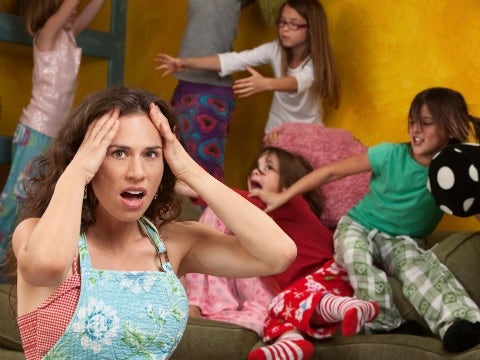
Stop suffering with anxiety disorder. These remedies are sure to help you, once and for all.
By Christina Marino — Written on Nov 19, 2014

According to latest research, approximately 20-30% of the entire US population suffers from some type of anxiety disorder that may require treatment or medical help. But before digging deeper in the therapeutic options, it is very important to understand what anxiety is and how to differentiate physiological nervousness to pathological anxiety disorders.
Feeling of agitation, nervousness or restlessness before an important event or occasion is normal; however, if you are experiencing following symptoms at frequent intervals, you may be dealing with anxiety disorder.
- Feelings of restlessness or extreme nervousness at petty stuff that are not even important
- Changes in the heart rate and rhythm of breathing at the onset of nervousness
- Light-headedness, dizziness, headaches, blurring of vision or shortness of breath
- An inability to concentrate or perform normal day to day operations
What are the primary causes of anxiety disorder?
Anxiety is a complex personality trait that is greatly influenced by:
- Serum level of certain hormones
- Family history of anxiety or other behavioral disorders
- Biochemical imbalances
- Environmental factors (such as exposure to certain toxins or heavy metals)
Healthcare providers believe that uncontrolled anxiety can lead to serious medical issues such as hypertension, diabetes type 2, cardiovascular issues (such as arrhythmia, palpitations) and other behavioral issues (intellectual deficit, changes in memory, stress disorder)
There are different types of anxiety disorders:
- Social anxiety disorders
- Phobias
- Panic disorders
- Generalized anxiety disorders
How to manage anxiety?
Management or treatment of anxiety is dependent on several factors like:
- Cause of anxiety
- Co-existing symptoms or conditions
Anxiety is usually managed pharmacologically by anti-anxiety prescription medications like benzodiazepines or barbiturates; however, if your symptoms are mild, you can definitely get help from alternative therapies. It is imperative to keep in mind that the decision to choose alternative treatment options over pharmacological therapy should be made by a registered healthcare professional.
According to a latest study published in the peer reviewed Seminars in Integrative Medicine, investigators suggested that 62% of the entire study population utilize complementary medicine for the management of symptoms like anxiety, depression and backache.
According to another study reported in the American Journal of Psychiatry, scientists suggested that more people use alternative medicine as compared to conventional treatment for the management of their depression or anxiety.
Alternative/complementary treatments for the management of anxiety
1. Psychotherapy
Psychological counseling helps a great deal in identifying the cause of anxiety besides allowing the therapist to provide proper counseling to the patient. There are several patterns and forms of psychotherapy such as cognitive behavioral therapy, relaxation therapy, and music therapy.
2. Dietary or lifestyle modification
- Minimize the intake of caffeinated beverages or brain stimulants to reduce the risk of experiencing anxiety attacks due to high levels of epinephrine.
- Make sure to maintain healthy sleep patterns. Research suggests that sleep deprivation can greatly affect the biochemical rhythm of hormones and may lead to anxiety attacks. An 8-hours of uninterrupted, restful sleep helps in improving the efficacy of herbal/ pharmacological treatments and minimizing the frequency of anxiety attacks.
- Minimize the intake of stimulants—chocolate, alcoholic beverages and illicit drugs that impact the brain.
- Increase your intake of omega fats (either supplemental form or dietary sources like avocadoes and fish) to optimize the synthesis of brain neurotransmitters.
3. Herbal treatments
Most anxiety victims prefer herbal treatments as the main-stay complementary therapy for a number of reasons—low side effect profile, minimal risk of interactions, holistic nature of treatment and low cost of the therapy.
Most popular herbal remedies are:
Related Stories From YourTango:
- Kava
- St. John's wort
- Ginseng
- Gingko Biloba
- Valerian
- Passionflower
- Theanine (richly concentrated in green tea or other herbal teas)
These herbal agents can be consumed in the supplemental (pill form), tincture form, herbal teas and in the form of aromatherapy.
4. Other popular remedies
- Meditation or yoga: spiritual therapy often help individuals a great deal in recovering from anxiety or depression related symptoms.
- Massage: can be used as an excellent tool to manage the symptoms of anxiety by promoting the blood circulation and inducing the release of relaxation-inducing chemicals in the brain.
Anxiety disorder is a serious condition and if your anxiety is affecting the quality of your life, you should seek help at earliest convenience. Likewise, despite the fact that complementary medicine often offers a huge help to anxiety victims, it is highly suggestive to consult your primary care provider before choosing herbal remedies or behavioral therapy because anxiety may be an early symptom of a more grave underlying pathology such as depression, panic disorder or bipolar disorder
About the Author: Christina Marino, DAOM, L.Ac. She is licensed by the State Acupuncture Committee with a Doctorate in Acupuncture and Oriental Medicine. Dr. Marino is also a Homeopath, Nutritionist, Functional Medicine Practitioner and an Intuitive Energy Healer. Christina's practical and philosophical approach to healing the whole person demonstrates that physical healing is inseparable from the mental, emotional and spiritual healing of an individual. Dr. Marino is owner of Alternative Health Care Concepts in Los Angeles, CA. She can be reached at (818) 505-9511. To learn more about alternative medicine please click here, or visit Christina’s Facebook.
